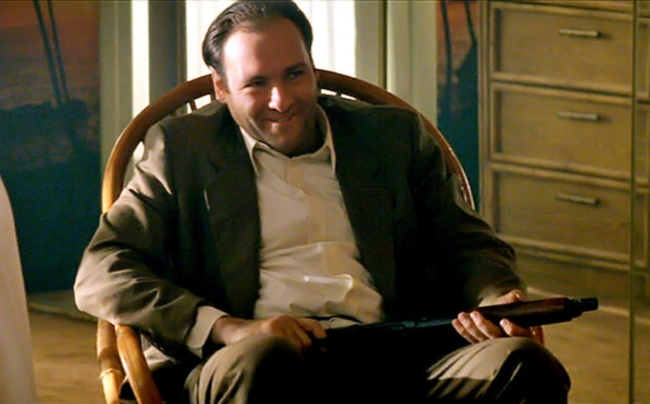James Gandolfini, Beyond The Sopranos
The actor is rightly celebrated for changing the way we watch television. But his big-screen contributions, from True Romance to Where the Wild Things Are, bear remembering, too.

You have by now no doubt heard the tragic news that actor James Gandolfini died yesterday at 51, evidently of a heart attack suffered in Rome, where he was vacationing and preparing for an appearance at the Taormina Film Fest. Elsewhere on the site, David Masciotra says much of what needs to be said about Gandolfini's towering importance to modern American television. It is not merely that The Sopranos--a sprawling, revolutionary narrative undertaking held together largely by the gravitational pull of Gandolfini's charisma--was among the best television shows of this era. It is the one without which few if any of the others (The Wire, Breaking Bad, Mad Men, Game of Thrones) would even have been possible.
Masciotra's suggestion that Gandolfini was the "Brando" of the small screen is particularly apt. Martin Scorsese once said of Brando, "He is the marker: There's 'before Brando' and 'after Brando'"; likewise, Gandolfini and The Sopranos represented an inflection point, a pivotal hinge in the evolution of televised storytelling. (There are more superficial similarities as well: Early in his career, Gandolfini appeared on Broadway in both A Streetcar Named Desire and On the Waterfront; both men studied the Stanislavski method, though Brando followed the Stella Adler school and Gandolfini, the Meisner technique.)
I was lucky enough to watch the first several episodes of The Sopranos before they aired on HBO in January 1999. (My wife was writing about television for Slate at the time.) But I was already a dedicated Gandolfini fan by that point, and in the midst of the current wave of--entirely accurate--stories about how Gandolfini changed television forever, I wanted to put in a few short words for his work on the big screen.
Like many, I first noticed Gandolfini as Virgil the hitman in 1993's True Romance, a performance he said was based in part on a real-life mob enforcer with whom he'd been friends. Gandolfini has a few good scenes in the movie, but his brutal, extended confrontation with Patricia Arquette is a small masterpiece. It was all there, even then: the volcanic intensity and physical carnality, the unexpected sensitivity and hint of playfulness, the knack for introspection, the longing for something he can't quite name. For those who haven't seen the scene--and perhaps still more for those who have--it's every bit as riveting as it was 20 years ago.
Virgil is the Gandolfini ur-role, the audition tape for a character, Tony Soprano, who hadn't even been invented yet. He'd play versions of this role for much of his career. I remember Gandolfini well in Crimson Tide, for instance, but I remember him still better as the stuntman-turned-enforcer, Bear, in Get Shorty: a kinder, gentler variation on his tough-guy theme. He played an ex-KGB hitman in Terminal Velocity, a duplicitous hitman in The Juror, a gay hitman in The Mexican, and a decadent hitman in Killing Them Softly. He played philanderers in The Man Who Wasn't There and Romance & Cigarettes, a sexual predator in She's So Lovely, and a pornographer in 8MM. There were castings against type along the way--Angie, for example, in one direction; In the Loop and Zero Dark Thirty in another--but Gandolfini's most memorable performances were rarely far outside the Virgil zone, the Tony Soprano zone. (It's ironic, given that the actor always maintained he was nothing like these characters, describing himself as a "260-pound Woody Allen.")
If there's one other role by which I will remember Gandolfini, it's as the incongruously named Carol in Spike Jonze's glorious 2009 epic of childhood, Where the Wild Things Are. Beneath the fur and CGI-tweaked expressions, it's all there once again, Gandolfini's remarkable capaciousness of character: tender and ferocious, easily wounded and just as easily roused to terrible violence, self-doubting yet effortlessly magnetic.
Other actors have shown greater range, but few have come to life so vividly, and left so deep an imprint on American culture. In Where the Wild Things Are (see the clip below), Max asks Carol, "Did you know the sun was going to die?" To which Carol responds, "C'mon, that can't happen." How could it happen? How did it happen? How can a celestial body disappear just like that?